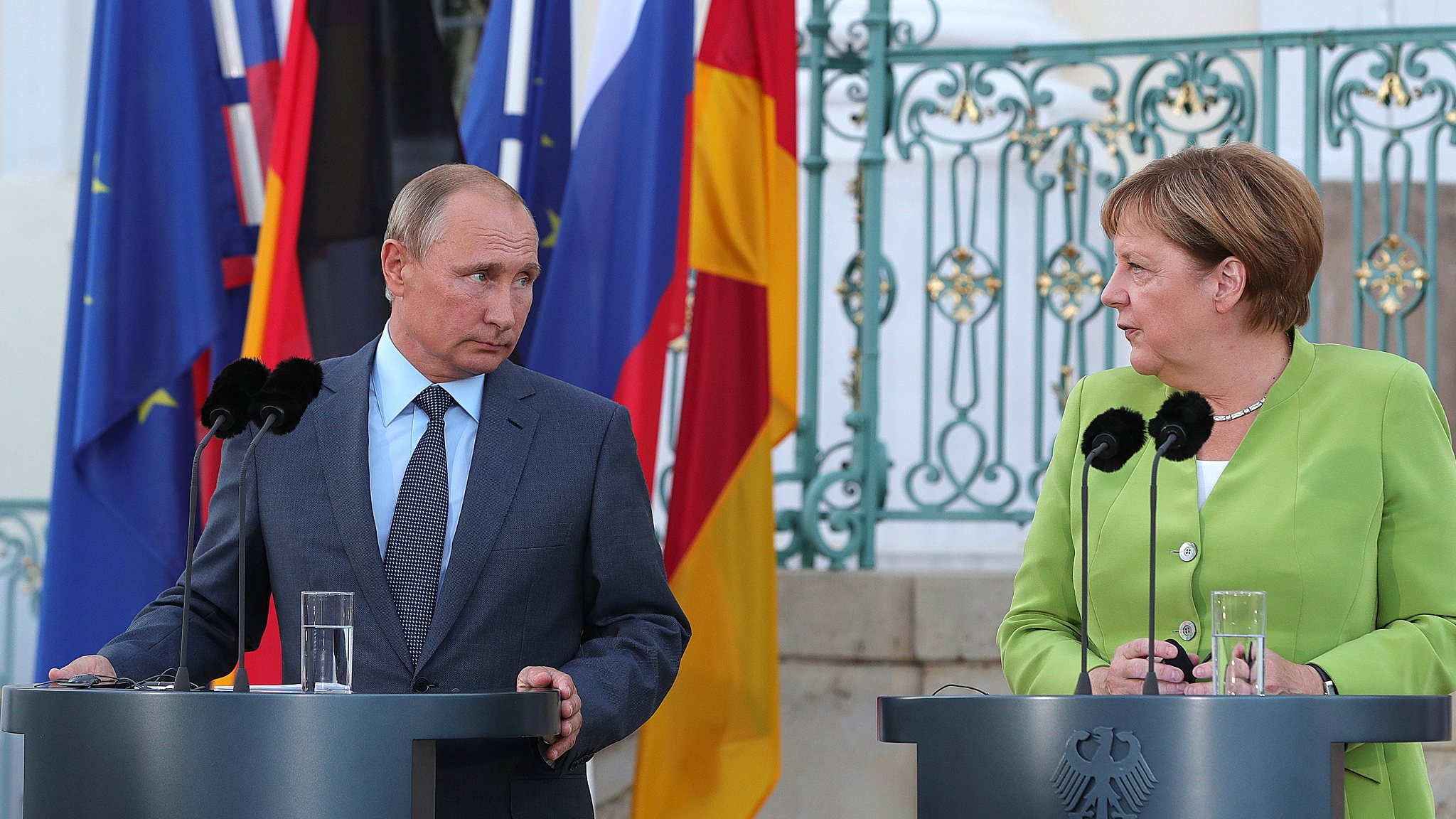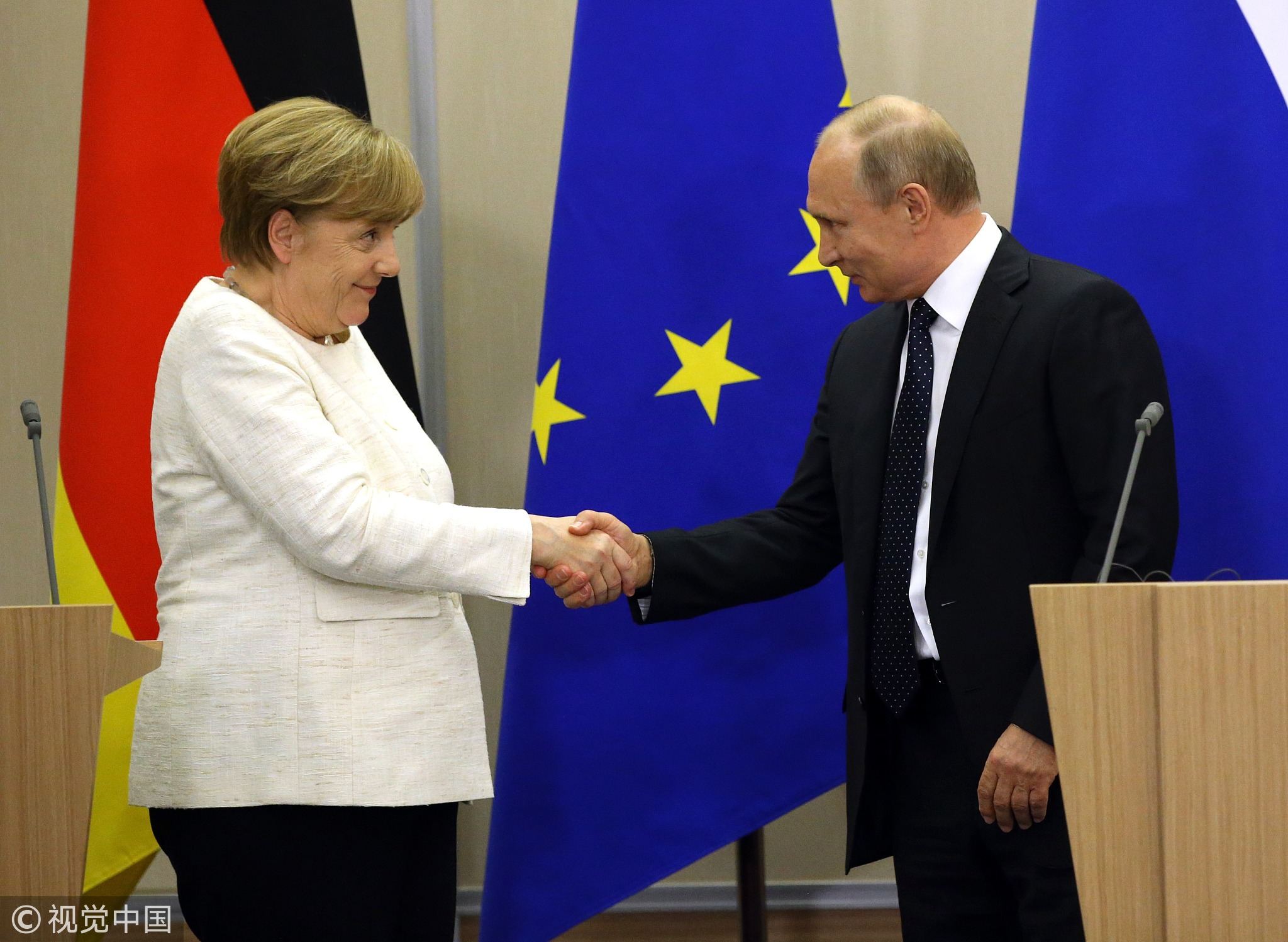
Opinions
13:29, 21-Aug-2018
Opinion: Putin and Merkel meet again to stay on the same page
Updated
13:08, 24-Aug-2018
By Cui Zheng

Editor's note: Cui Zheng is an associate professor at the Center for the Economies and Politics of Transitional Countries at Liaoning University in China. The article reflects the author’s opinions, and not necessarily the views of CGTN.
In response to German Chancellor Angela Merkel’s visit to Sochi in mid-May, Russian President Vladimir Putin paid a visit to Germany on August 18. The two leaders had a three-hour meeting in Meseberg, a town north of Berlin. Before the meeting, they held a press conference to give a briefing on topics to be discussed, which is quite uncommon for such occasions.
The press conference emphasized that this meeting was held not for reaching a certain agreement or making a certain statement, rather it aimed to bring Russia and Germany back on the same page on sensitive international issues against the backdrop of worsening relations between the western world and Russia.
It also held the hope that Germany could take on the role as a mediator that facilitates Russia-Europe reconciliation and resolves disputes between Russia and the US.
Russia-Germany relations moving towards normality
Since the referendum held in Crimea which supported accession to Russia, Merkel had become one of the sharpest critics of President Putin, which brought the relations between the two countries to a new low. Since 2014, Mr. Putin and Merkel met for only two times, yet this latest meeting marks their second one-on-one meeting in three months.
Five thousand German companies created 270,000 jobs in Russia, and the two-way trade between the two countries increased by 22 percent over the past year. A survey also shows that most Germans believe Putin is more politically reliable than Trump. All these figures have rebuilt the confidence of the leaders of the two countries to bring about a normalization of their relations.

Russian President Vladimir Putin (R) greets German Chancellor Angela Merkel (L) during their joint press conference at Bocharov Ruchey State Residence in Sochi, Russia on May 18, 2018. /VCG Photo
Russian President Vladimir Putin (R) greets German Chancellor Angela Merkel (L) during their joint press conference at Bocharov Ruchey State Residence in Sochi, Russia on May 18, 2018. /VCG Photo
As participants to the Normandy Format that aims to resolve the crisis in Eastern Ukraine, both Russia and Germany agree that full enforcement of the Minsk Agreements is the foundation of a ceasefire in Eastern Ukraine.
The leaders of the two countries intentionally avoided the issue of Crimea in their discussions, hoping that this exceedingly intractable problem wouldn’t stand in the way of improving relations. Instead, they sought common ground on issues of shared interests.
The Syrian issue is a case in point. Though Germany isn’t directly involved in military actions in Syria, Merkel has seen, first hand, the severe consequences of conflicts in the Middle East. Germany, as the main recipient of Syrian refugees in Europe, has seen the refugee issue become a source of division within the governing coalition led by Merkel.
Russia’s goal is to avoid the US gaining ground in Syria, to attract more European countries to get involved in the post-war reconstruction of Syria, and to help more Syrian refugees to return to their homes. Though critics say that Putin’s ideas are unrealistic and difficult to put into practice, Merkel reacted positively to this plan, which might address the refugee problem that has been pestering Germany for quite some time.
An “independent” Germany, free from manipulation
“Nord Stream 2” natural gas pipeline is an important topic on the agenda of this meeting. This planned pipeline circumvents Eastern European countries such as the Ukraine and Poland, goes through the bottom of the Baltic Sea, and transports Russian natural gas first to Germany and then to other European countries. The plan has long been the focal point of American criticism.
The public position of the US is that this project would not only rob the Ukraine of 2.5 billion euros of forwarding fees per annum, but it also goes against the very grain of the goal of uniting the West against Russia. Trump doesn’t want to see close energy connections between Europe and Russia, and as a result, has threatened to impose sanctions on companies involved in the “Nord Stream 2” project.

Pipes are loaded onto a vessel in the northern port of Mukran, on the island of Ruegen, Germany on February 28, 2018. /VCG Photo
Pipes are loaded onto a vessel in the northern port of Mukran, on the island of Ruegen, Germany on February 28, 2018. /VCG Photo
Since 2014, Germany has followed the US in imposing sanctions on Russia. However, Germany suffered almost as much as a result of these sanctions due to their deep historical ties and close economic and trade relations. In return, Germany has received absolutely no financial compensation from the US, been pressured to increase its spending on NATO joint defense, and faced fierce US trade provocations.
On July 11, during the NATO Summit, Trump accused Germany of doing the bidding of Russia. Merkel responded by saying that every decision made by Germany is “independent.”
Merkel will not appease the US, both out of the need for cultivating an independent political image and for protecting the national interests of Germany (if the Nord Stream 2 project fails, Germany will have to accept the more expensive liquified natural gas from the US). That represents a window of opportunity for Russia which seeks to find the chink in the armor of sanctions.

SITEMAP
Copyright © 2018 CGTN. Beijing ICP prepared NO.16065310-3
Copyright © 2018 CGTN. Beijing ICP prepared NO.16065310-3